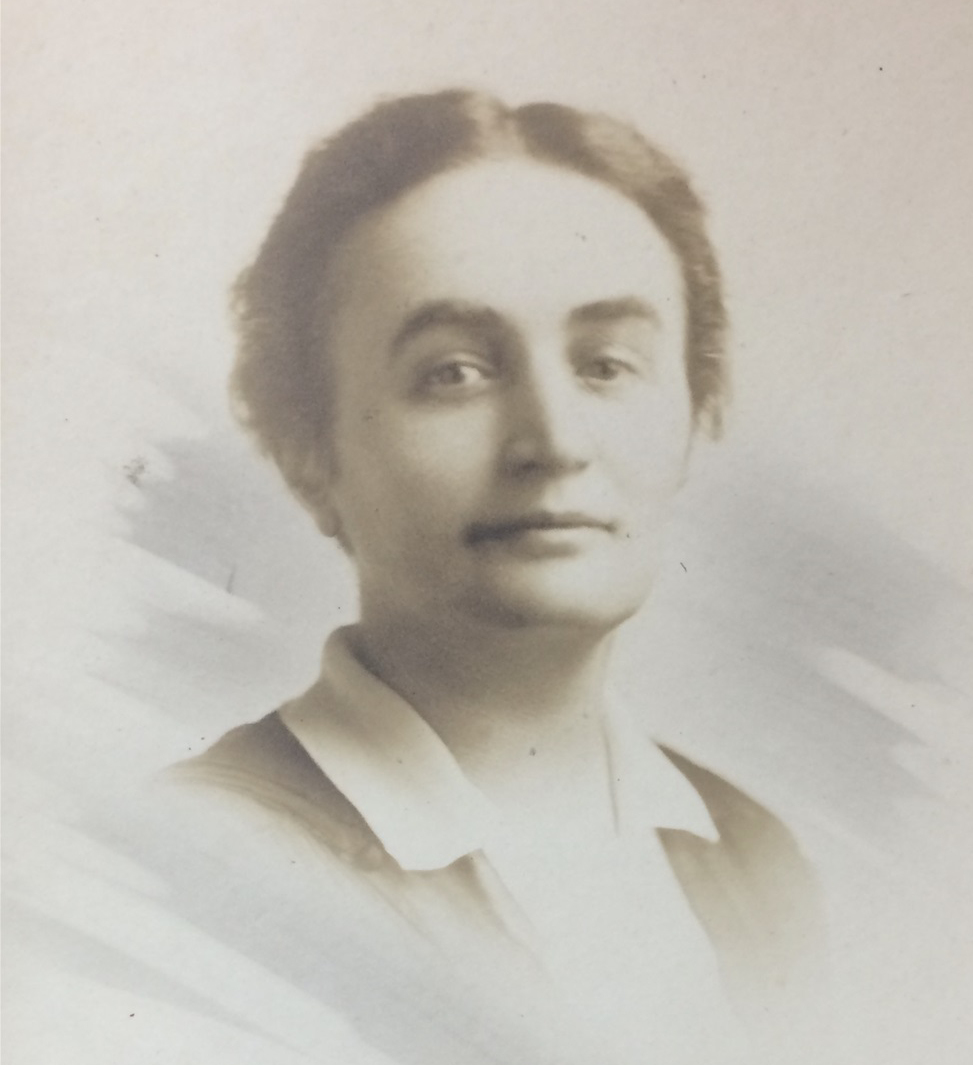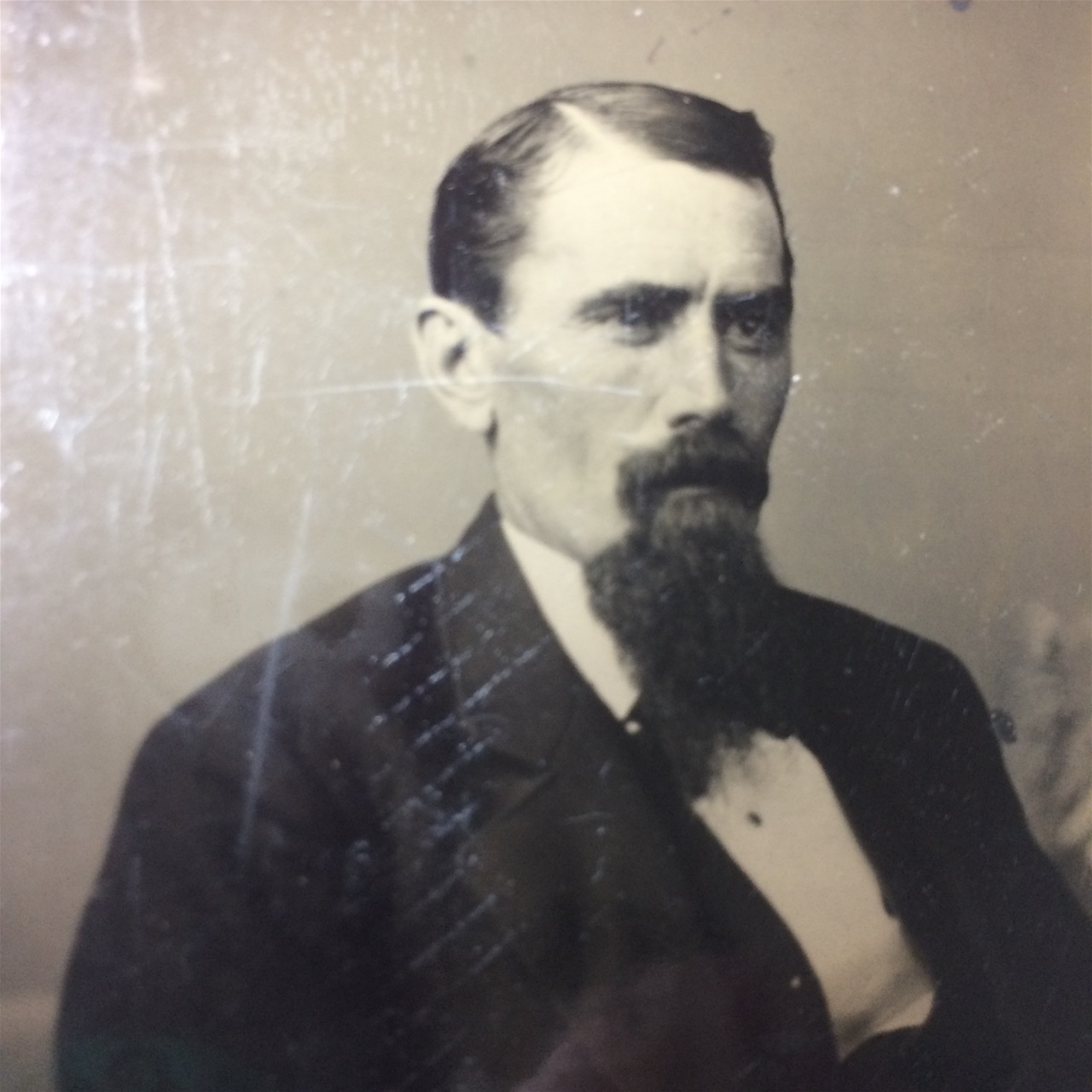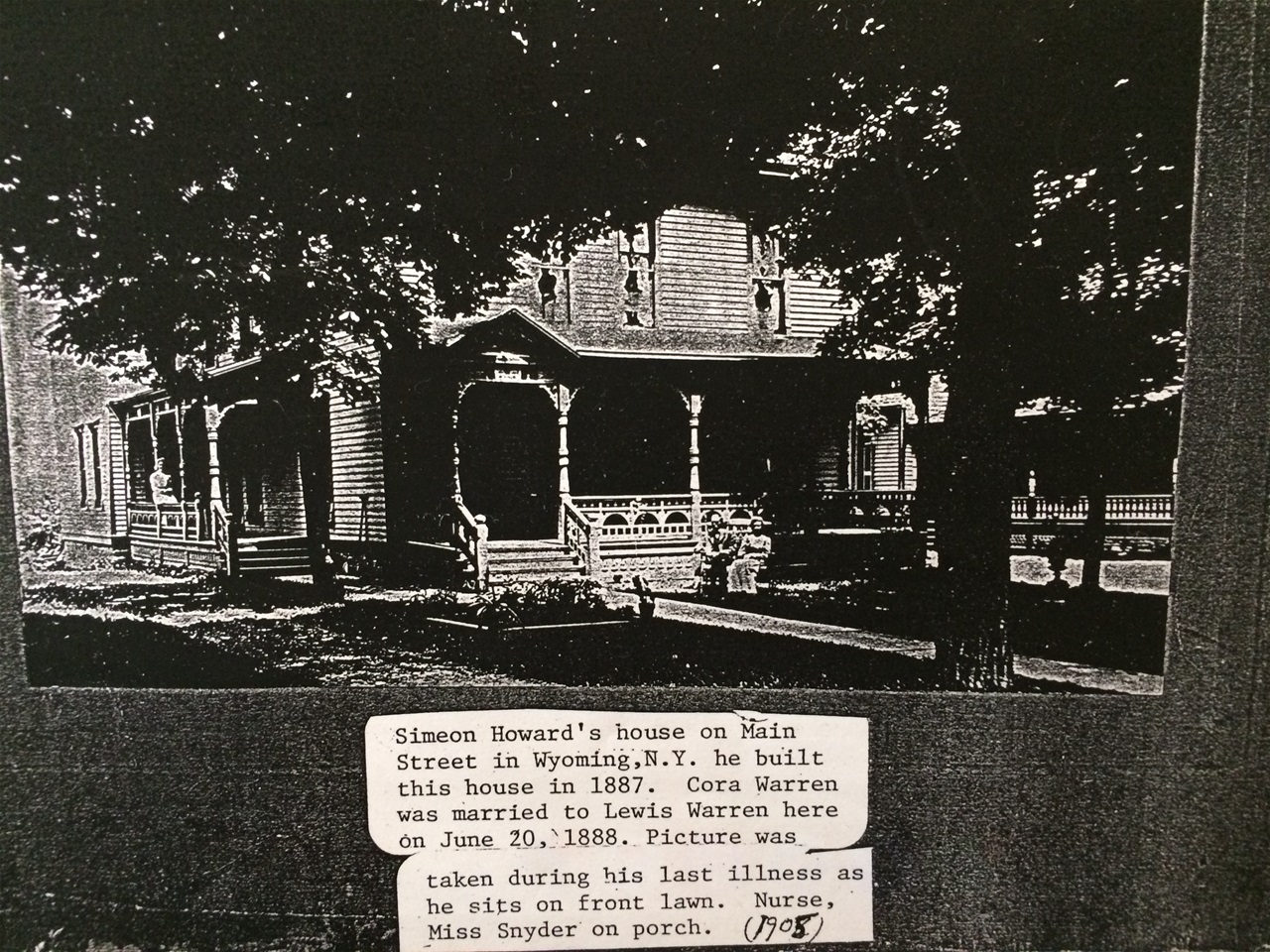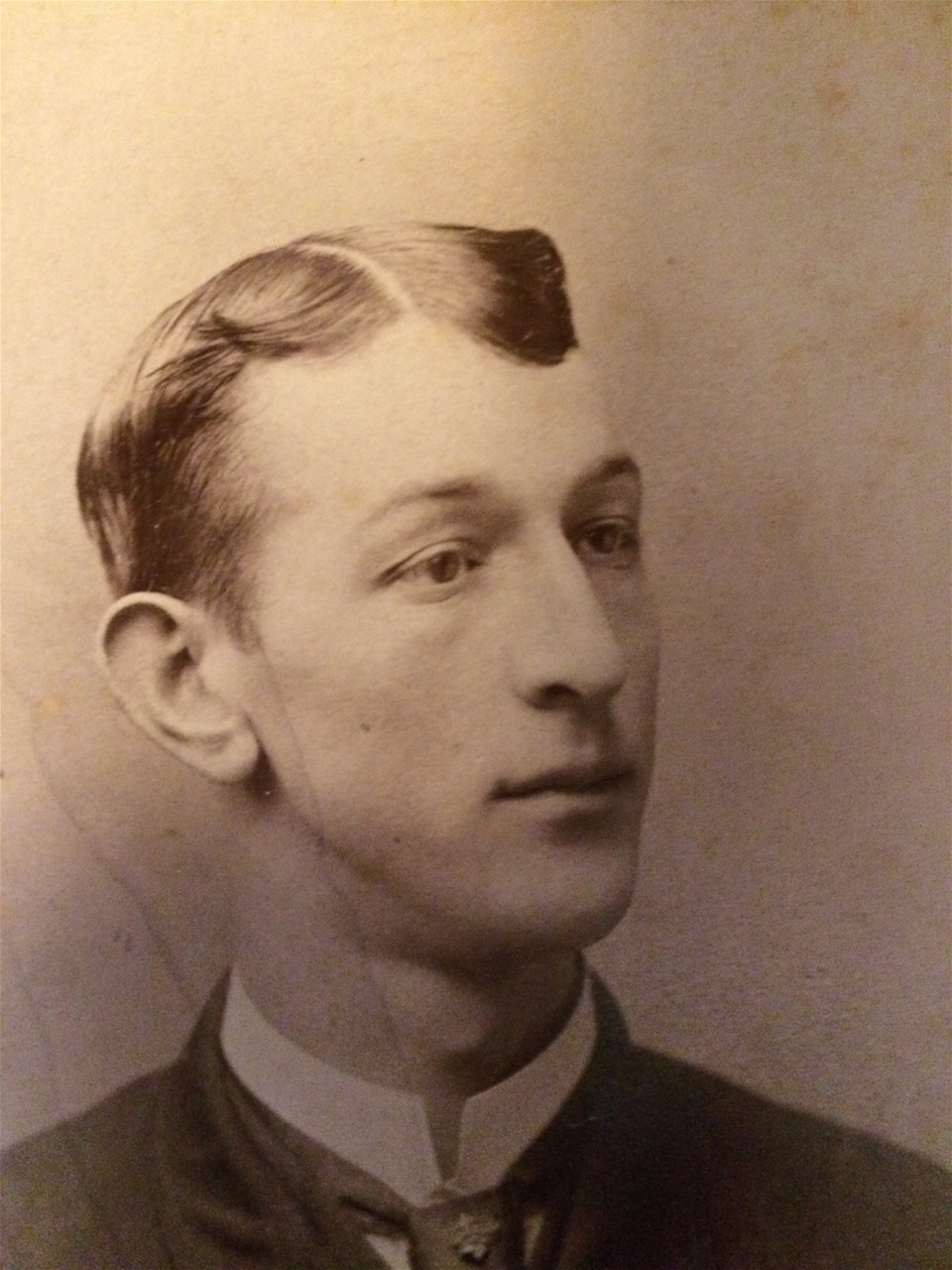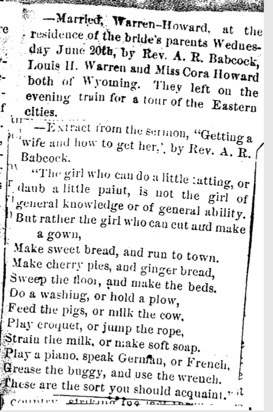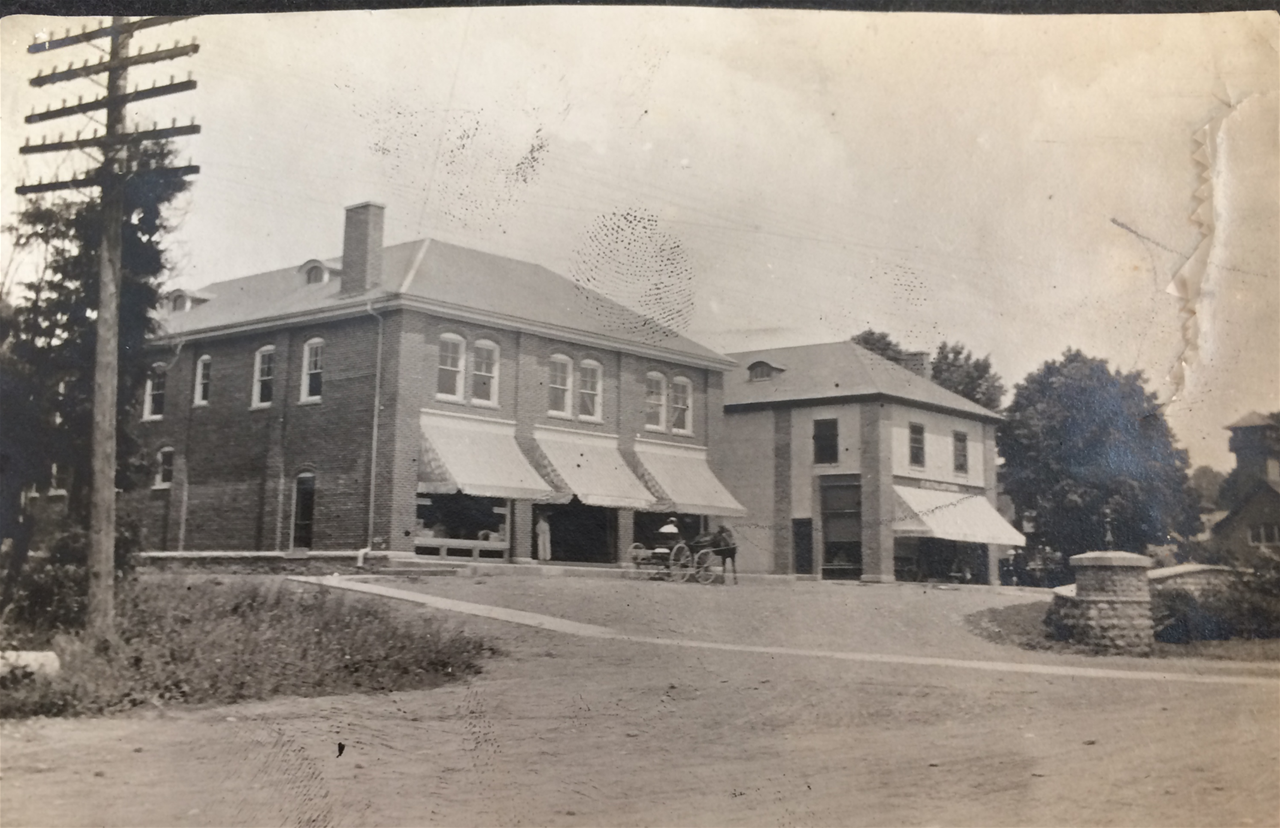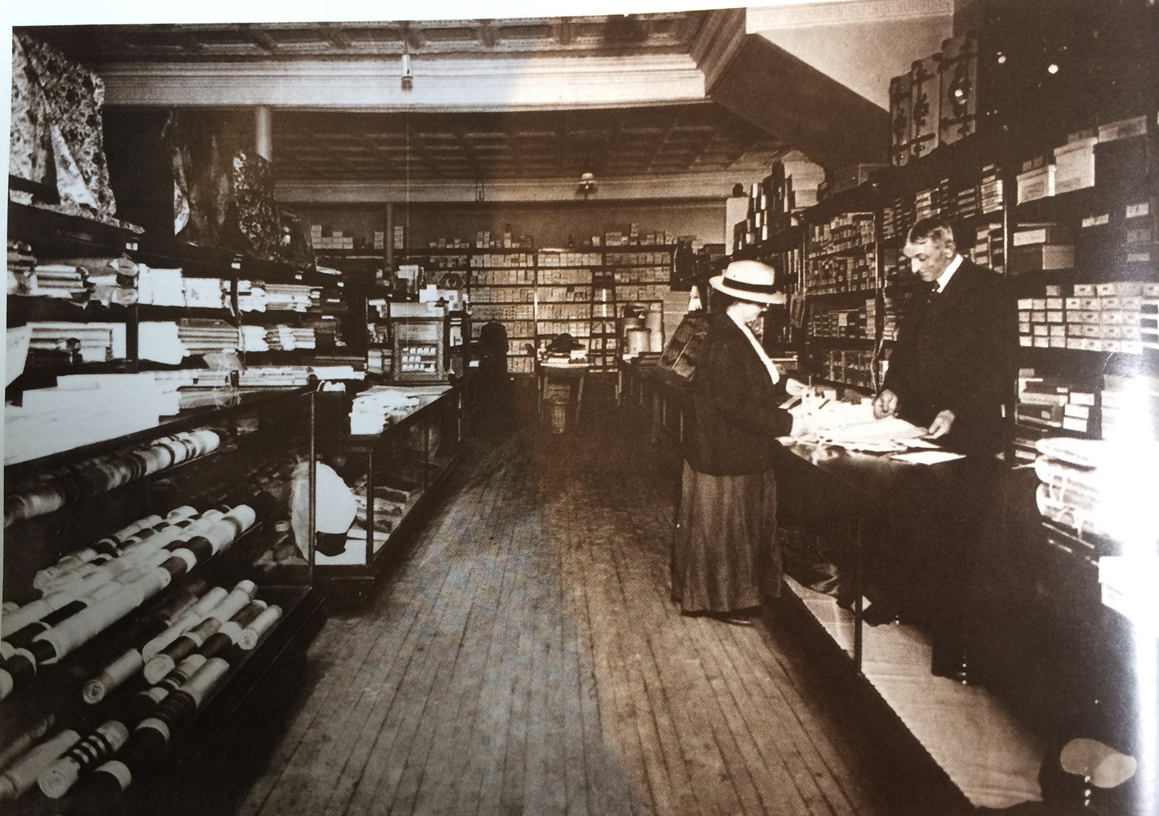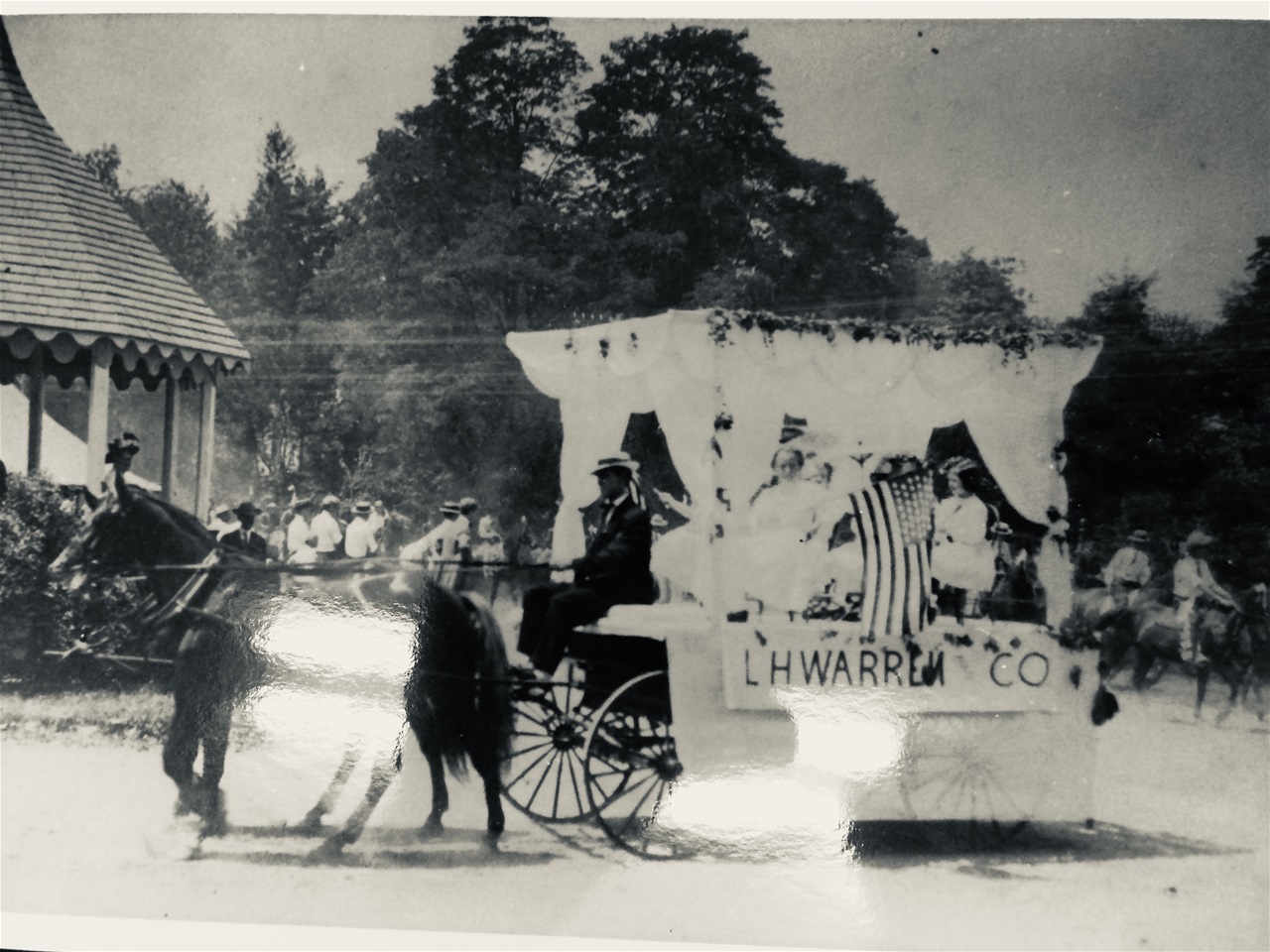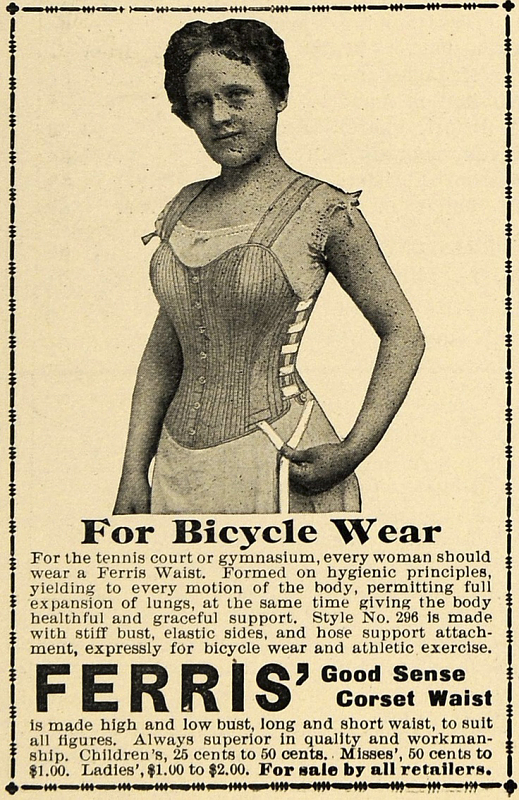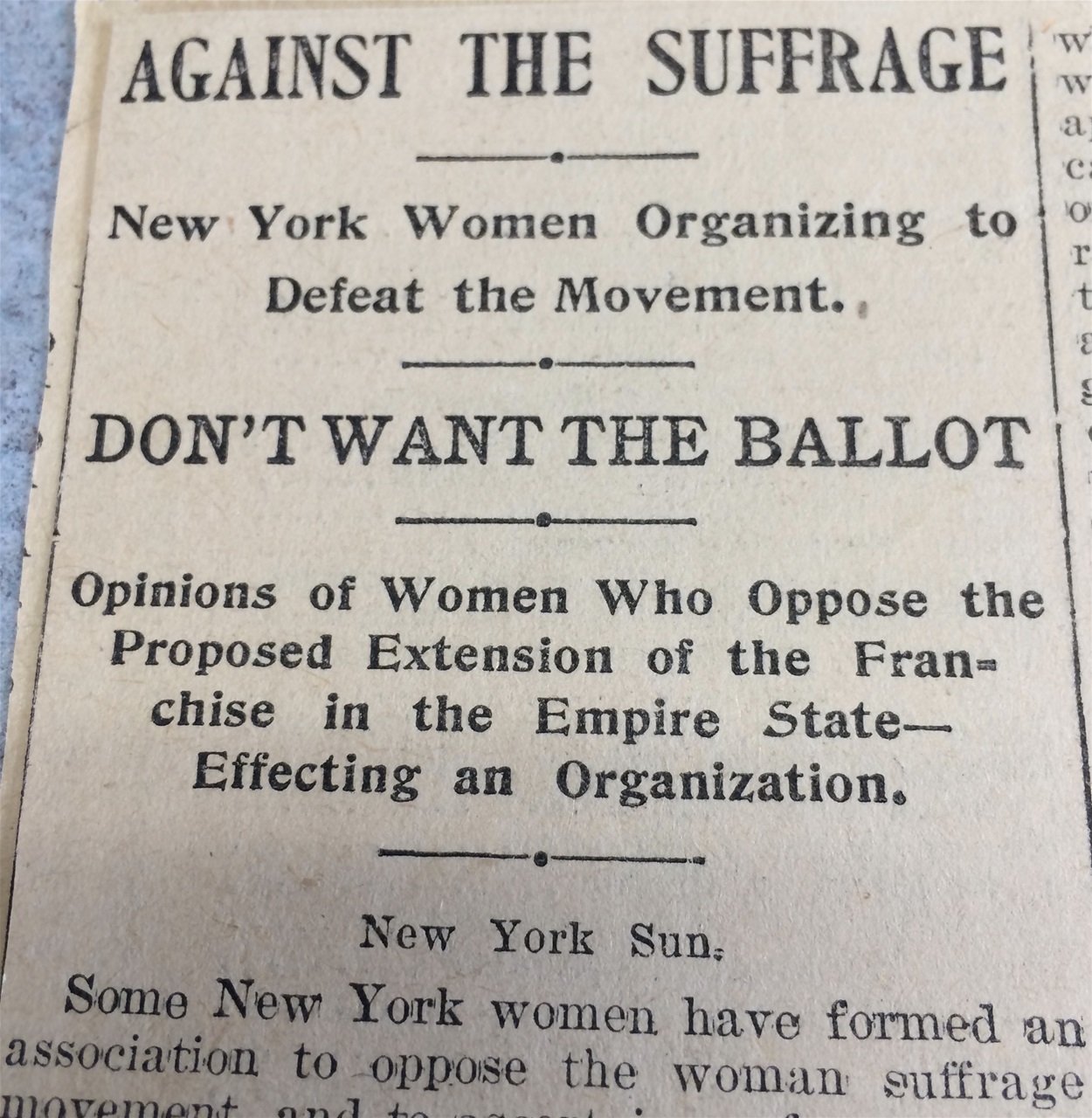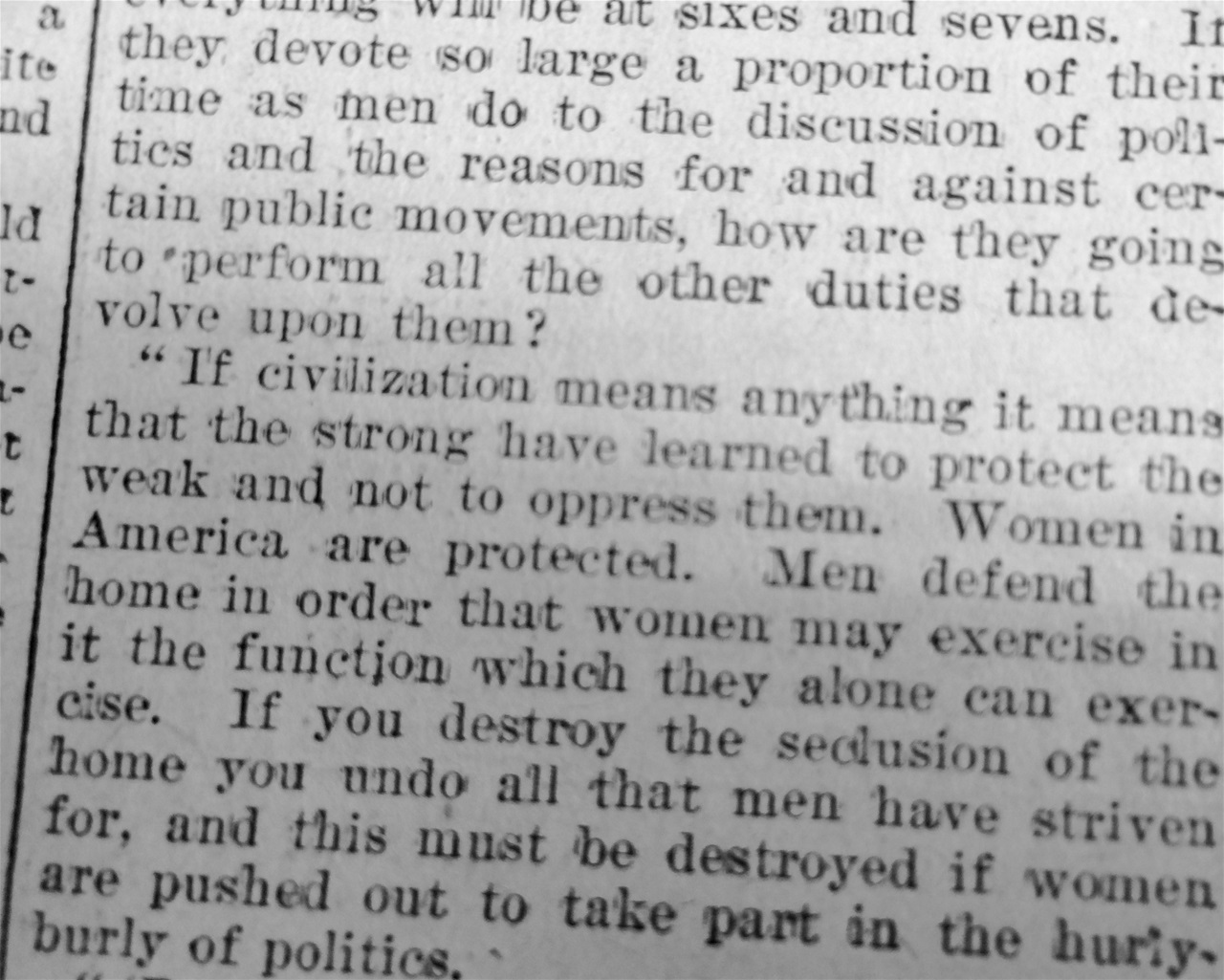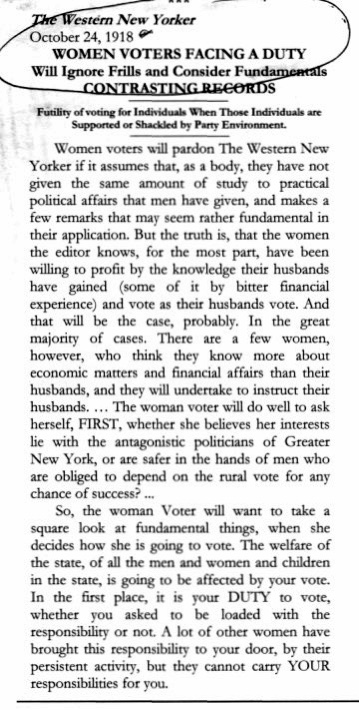This time...
Cora Mae Howard Warren:
The grandmother we never knew.
Cora Howard Warren was my father's mother. She lived nearly her entire life in the then-prosperous village of Wyoming in western New York State, her adult life as the wife of Lewis Henry Warren, village storeowner.
I never met her. Cora died six years before her son Howard married my mother, Rhoda Bailey, in 1940, so she never knew that 40-year-old Howard married at all, never mind that three beautiful grandchildren ensued (that'd be me and my two brothers, Lewis Howard and David Simeon) to complement the two granddaughters with whom her daughter Marion had long since delighted her. Still, I have such a lot I'd like to tell you about her because I've been left a veritable plethora of ephemera that tells us some of the smallest details of her life in Wyoming village over those 67 years.
But first, what can we see for ourselves in Cora's portrait above, taken in 1919? There's that confident lift to her chin, some sadness in her eyes balanced by a little half smile that looks like it could turn in to a chuckle at a moment's notice. There's no obfuscating frippery to Cora here, her hair is pulled straight back, she wears very tailored clothing--nary a curl nor a ruffle nor a jewel has she thought it important to don for this formal portrait. At this point in her life (she was 52) , she says to us "Here I am, hurry up with this picture--I have things to do."
CORA HOWARD WARREN left an interesting life to for us talk about this time. From 1867 to 1934, her life spanned the coming of phonograph records, the telephone, and radio broadcasting. It spanned the entry into a new century, with all the excitement we may remember from our own entry into the 21st century. Natural gas and then electric lighting replaced the fire hazards of open-flame lighting and heat, which would come to have huge importance to her. World War I was fought and won, automobiles supplanted horses as the main local transportation mode, aviation came along, all during Cora's lifetime. And of very most interest to me, votes for women in 1920--DID Cora vote that first time? We'll take a fast and admittedly superficial look at how some of these were experienced by Cora and Lewis Henry Warren's family in the village of Wyoming, NY.
Like us, Cora lived through a flu epidemic, hers in 1918, sharing some of our own COVID experiences of this last year--masks, distancing, cancelled church services and meetings, fear of a deadly illness. Thankfully, now that our own life is approaching normal again I can resume the family research which depends so heavily on the help of others, particularly Cindy Amhrein and Sally Smith in the Wyoming County Historian's Office and Doug Norton, the Middlebury Town Historian. I thank them.
You may remember our last family story which concerned the life of Henry Clay Warren, our great-grandfather, the first in three generations of our Warren family to own a village store in Wyoming, NY. That story and the earlier ones about our Bailey ancestors are still here up above--click on Previous Posts and they are all there for you. This time we will move one generation closer--with our focus not on Henry's son Lewis Henry Warren, but on Lewis's wife, Cora Howard Warren.
(An aside: Be prepared, we will plunge now into the serpentine pit of family names: Great-grandfather Henry Clay Warren begat a son, Lewis Henry Warren who became Cora Howard's husband and also our grandfather. Lewis Henry Warren begat Howard Lewis Warren (our father), who then begat Lewis Howard Warren (my brother). There is nothing much else I can do to help you here, just muddle thru as best you can. Except maybe let's take it easy on the folks who name their kids those onofakind names with unique spellings-- genealogists will thank them.
Cora's early life was a hard one for a little girl. Her mother Ellen died of tuberculosis in 1869 when Cora was 22 months old. She was sent to live with her grandmother, separated even from her younger sister Jennie who went to an aunt and uncle, both to live on farms outside the village. Her father Simeon Howard was a farmer who had no means to care for his two little ones alone.
Six months later Simeon Howard remarried and soon he and his second wife Louisa Tabor Howard produced two little half-sisters for Cora and Jennie, Eva and Lulu. Simeon's short wait to re-marry may seem disrespectful to us now, but I've read that back in the days when women's death in childbirth was so common, in fact, when all early deaths were common, that early re-marriage after a spouse's death was accepted as a way to cope with the unpredictability of life and to maintain stable families. Cora and Jennie were re-united with their father and new step-mother after this and they grew up together with their new sisters.
This Simeon, Sim as he was called, ran a big farm over the hill in Dale (or should one write "o'er the hill in Dale"?)
In the years after the railroad was laid through Wyoming in 1881, Sim became a successful buyer and shipper of local produce, beans in particular. He bought crops from local farmers and shipped them off to city markets on one of the several steam trains that puffed noisily thru Wyoming's depot every day. As his business grew, he added warehouses and a grain mill near the rail line, and even bought a house there so the manager of his shipping business could live close by. Soon Simeon could hand his farm management over to others and work solely on this produce shipping enterprise. He built himself a big new house in the village in 1887 where he lived out his life, sadly a relatively short one since he died in 1905 at only 66.
Now it had come to pass that a nice-looking guy, Lewis Warren, lived with his family on Main St, right across the road from this new house. Lewis, a relative new-comer to town, worked with his dad in their hardware store uptown and walked to work every day.
At that time, when horses were the mode of personal transport, most business people lived in the village within walking distance of their work. And really, why take time to saddle a horse and pay someone to feed and shelter it all day when it was more economical, less work and just about as quick to live close by and walk to work? Since it was also the custom to have their large "dinner" meal at midday, village businessmen walked to work in the morning, home for dinner, back again to work again till supper time.
So.... there we are, Ancestry, with handsome Lewis sauntering up and down the street past Cora's window three times a day...it's easy to see what happened next.
Of the thousand family papers I do have, it's the one I can't find anymore that tantalizes me. There WAS, I KNOW there was!! a letter from Cora to her sister Jennie when she wrote, "I don't know if I should marry Lewis Warren..." Of course we are quite happy about her decision. Their wedding was held in her parents' home in the summer of 1888.
The local newspaper's account of Cora and Lewis's wedding we saw in the previous post about Henry Warren, but it deserves a second look. The poem the minister chose for the occasion gives us insight into the young woman Cora has become--confident, capable, intelligent. (Not to mention insight into the Reverend Babcock himself. ) Let's read the announcement again:
Is it possible to read a little derision into the pastor's poem, or is that just me? The part about buggy grease and wrenching seems designed to induce indulgent chuckles from the gentlemen in the congregation. We'll read more about the prevailing thoughts about women's ideal functions in society in a bit.
There. Now that we have Lewis and his very multi-faceted wife married and cozily settled into the little apartment upstairs over Lewis's family's hardware store in the village center, let's tactfully step away for a bit and talk about the village that Cora and Lewis knew, because it was vastly different from the quiet place we are familiar with now, or even a village we might have grown up knowing so well a few decades ago. It's one of those things that we "know" already because we've seen the pictures and heard the stories, but we might take another quick look at how very different those little towns were in the years from about 1890 to 1910, how busy and active and full of life......
On the west side of Academy St. in the village center, where the Gaslight Market and the Post Office now stand stolidly apart behind the boulder wall--on that same rise Lewis and Cora had their own store at the end of a row of six stores, each with apartments and offices above, all squeezed together in that same space. Down Main Street and up the Gulf Road were more businesses, a blacksmith shop, a harness maker, dressmakers working from home. There was a millinery shop (that's hats). MIddlebury Academy down a little farther disgorged gaggles of students into town at regular intervals. The three churches had full-time pastors and a busy schedule of meetings and social events.
Now we can picture a busy and prosperous, nearly self-sufficient village. We can hear church bells tolling deaths and warning of fires, horses clopping and buggies creaking, students laughing and jostling, horsing around on their walk home , and trains snorting their steam from the depot a mile away. We smell the horses, hear shouts of voices calling friends, and a few curses as people stepped in muddy ruts in the streets.
Then, in 1891, a raging village fire burned their store and little upstairs home to the ground. After 8 years of struggle to get back on their feet after the fire, including a bankrupcy, Cora's father, Simeon, stepped in and financed the purchase of a larger store in the newly re-built village center for Lewis to operate.
Unbelievably, 17 years later fire struck the village center yet again in 1908, once again burning Warren's store and the entire business block to the ground.
These village conflagrations were all too common, unfortunately. We've all read about the huge Chicago fire in 1871, but big fires were a common and devastating fate in even small villages. Bergen, Clarendon, Warsaw, Perry and Gainesville were just a few villages near Wyoming where entire business blocks were burnt to ashes within hours in those decades. Open flame lighting and heating was usually the direct cause, but lack of speedy fire response and flammable building materials abetted the destruction. At the time of the 1891 fire Wyoming had no fire department whatsoever.
But, as Pastor Babcock so well informed us on her wedding day, Cora was a girl who knew how to use a wrench. She was the very example of a capable person who virtually rose from the ashes, and went firmly back to work again.
The Warren Store and Tillotson’s Hardware as they were re-built after the fire of 1908 destroyed the village business center. They have slate roofs and are built of brick and stucco. They are well detached from each other. Well-known architect Claude Bragdon of Rochester worked with Cora and Lewis and other town planners to make these buildings as safe from fire as possible at the time.
Cora worked alongside Lewis to make the new store successful, traveling regularly to Rochester on the train herself to buy inventory items like fabrics and clothing at the large wholesalers, sometimes taking her young daughter, Marion, with her. (My father, Howard, when he owned the store, later continued the practice, sometimes taking me out of school for the day to go to Rochester on a buying trip.) Local women appreciated Cora's taste and discernment of quality in the fabrics and household goods the store offered.
Together the couple worked to build not only their business, but the village itself. Lewis was active on the board that secured a natural gas line through town, and famously for the village, that agreement called for gas street lighting to be provided free for 100 years. The couple personally helped to underwrite entertainments at the newly-built Village Hall and even the Hall itself when financial support faded away early on. They were active in their church. For the Centennial of the Presbyterian Church in 1917 Cora was instrumental in bringing the president of Elmira College to give the keynote speech. Lewis served as village mayor for a time, and was on the cemetery board of directors. They were both constant workers and supporters of the village they cared deeply about.
This photo is a great picture of what it meant to have a family store back then. We see a pony hitched to a sleigh loaded with milk cans probably intended by the dairy farmer for barter for groceries and clothing. Lewis may be seen in the background. In my father's day it was eggs I remember people sometimes brought to him, some with straw still attached from the hen's nest. (One eccentric old lady regularly brought him eggs with a few of her chickens riding along to the store in the car with her.). And even more often, accounts records way back in great-grandfather Henry's hardware store days show him accepting "2 gals. of maple syrup and 1/2 cord wood" as credit towards a customer's order for barbed wire and nails. A good part of staying self-sufficient as they needed to be.
Now let's move on and take a look at a part of Cora's story I couldn't wait to get to know. When I learned about Cora's strong character, and knowing that era in which she lived, I immediately most wanted to know if she voted that first time in 1918 when women were allowed to vote in Wyoming County. (The 19th Amendment to the Constitution was passed mandating voting rights for all American women in 1920, as we know...but Wyoming County was 2 years earlier and that much ahead.) Was my grandmother Cora interested in politics or even in working for women's equal rights? I admit I wondered condescendingly if the wave of social action had filtered down much to country villages, and even how aware they might have been. Wow, did I have something to learn!
Cora Warren and the Women's Suffrage Movement in the village of Wyoming
Sally Smith, Deputy Wyoming County Historian, was so helpful to me in finding this information, I could not be more grateful. The first arresting fact I learned: The Susan Look Avery Club, the women's social club in Wyoming, was formed in 1900 as the Wyoming Political Equality Club. Its express purpose was to work towards equal rights for women. Both men and women were members. Imagine my delight at finding Cora was a charter member! The name of the club was later changed to the Susan Look Avery Club to honor the founder's work and their focus, after the vote was attained, became educational and philanthropic.
Prior to this, Susan Avery was also a founder of the neighboring Warsaw Political Equality Club in 1891. Avery was such a well-respected member of the women's movement that Susan B. Anthony herself visited Hillside, Avery's summer home in Wyoming, for a three day conference with other reformers in 1900, so we could even assume that Cora Warren and other Wyoming women met her then. Ms. Anthony visited Wyoming County another time, too, as the guest of Frances Willard, leader of the powerful national Women's Christian Temperance Union, in Castile in 1898.
I want to share with you a quote from Willard, a description of S. B. A's visit to Castile NY, where Willard made her winter home with her friend Dr. Cordelia Greene at Castile Sanitarium (Castile for the winter?? It's true. Willard wrote glowingly of "breathing deeply on these cold winter mornings" and the "comfort of the evergreens". This was apparently before the invention of Florida.). I do want to share Willard's description with you because the story brought Susan B. Anthony to life for me as nothing has before. Willard wrote, "[When it was time for Anthony's train to arrive at the Castile station] we gathered in a group at the door as they drew up, it being my intention to 'help Susan out.' But I saw that anybody less swift of foot than a football expert need make no such attempt. Forth stepped Miss Anthony, seventy-seven years of age, with traveling bag and umbrella, her movements as balanced and agile as they were a half-century ago, her face lighting up with smiles and a cheery "How are you?" as she walked in, a breeziness that seemed perennial."
There it is for us, that word picture--a smiling, cheery Susan Anthony! Of course she did, of course she was, but for we who never see a thing but her grim face in shades of gray in photos with a tight hair bun and that straight firm mouth--for us to "see" Susan's face lighting up with a cheery smile! Thank you, Frances Willard.
Now we certainly aren't going to outline the course of the struggle for voting rights for women because it's not our focus, and because you've already read the book and seen the movie. But I will share some quick facts that caught my interest when I was reading for this story.
We know the movement for women's suffrage started in 1848, even before the Civil War. Over 70 years of political wrangling back and forth took place until the vote was given in 1920. The struggle outlived Susan B. Anthony, who died in 1906, never seeing the success of her work.
In the case of suffrage, the huge WCTU, Women's Christian Temperance Union, was working hard in support because they were working for prohibition of alcohol sales and thought women were likely to vote in support of their platform. The Liquor Lobby funded opposition to women's votes for the same reason. Other groups the same, the struggle went on for decades.
And, honestly, to hear the bicycling enthusiasts tell it, they are single-handedly responsible for the advancement of universal women's rights and freedoms. It's true that with the new same-sized wheels and soft pneumatic tires the bicycle greatly increased a woman's range of independent travel and contacts. And as a result women began to demand looser more comfortable clothing that allowed them to breathe easily--and so the slide for the home base of freedom began! Susan Anthony herself stated in 1896, " I think [the bicycle] has done more to emancipate women than any one thing in the world. I rejoice every time I see a woman ride by on a bike."
But wait! It's not so simple...There were a great many women themselves who were opposed to voting. Let's take a look at their point of view:
That headline is from a long article in a New York Sun newspaper of October, 1895 which was reprinted for local readers.
It states, entertainingly to me at least, "The starters of [our] movement, who intend to devote their personal efforts to the cause, are women whose natural inclinations make publicity distasteful to them, and they have refrained from taking any decisive step until the apparent success of the opposite party renders action imperative." A splendid no-fail plan for an attack, ladies! "Let's sit here daintly fanning ourselves until it's certain the un-feminine pro-voters are winning, then we'll have tea and figure out what to do next." But that's not fair of me, I know...people have a very hard time seeing outside the paradigms they have lived in for a lifetime. Same thing we're seeing with racism now....
Below is one paragraph from the article that supports the anti-voters' position.
We'll end with this editorial from the Western New Yorker paper published in Warsaw just before the first women's voting day in Wyoming County in 1918. Don't miss the last sentence which says, in essence, "Some other pushy women have brought this voting duty to your door, ladies, and since they have forced the onerous duty upon you, you are now going to have to do it." So be it.
Well! I've indulged myself with all these stories and strayed far from the life of Cora (who certainly did vote, she was a registered Republican like most others in the village--but we have no information about any bicycle riding she may have done).
So we'll close quickly here--I know you have things to do. Cora and Lewis had two children, my father Howard Lewis and his sister Marion Dorothy. Marion was given a college education, she went away to Elmira College in 1915, as only very few women did then.
My father, Howard, ...not so much. In my family paper files are a few abysmal report cards from his elementary school years. Next a photo of him in the imposing school uniform of Staunton Military Academy in Virginia, shortly followed by a letter home stating, "You can make up your mind I am not coming back here!" Accordingly, the next year found him at Cook Academy in Montour Falls, NY where the only surviving archival information on the education he attained there is a photo with the football team and a much later letter from a friend who addressed Howard as "Jake" and reminisced fondly about time the two of them somehow got a horse up to the third floor of the dormitory. (We don't worry about this in our family. There are several of us now who might be smart enough, but we are just not book learners, is how we describe it. I include myself right up high on that list.) Howard went on to inherit the Warren Store in 1938 and managed it for the nearly 20 years until he sold it to James Dourie in 1955.
Simeon and Louisa, Cora and Lewis, Howard and Rhoda...they are all now on the peaceful west hill in Wyoming overlooking the beautiful valley. Resting well, and well-deservedly, from their long labors.
I hope you've enjoyed the story of Cora and Lewis and sharing their part of Wyoming village history with us. Please share your own thoughts and reminiscences with us before you go...and your opinions, too, of course.
Click here for a Bibliography
